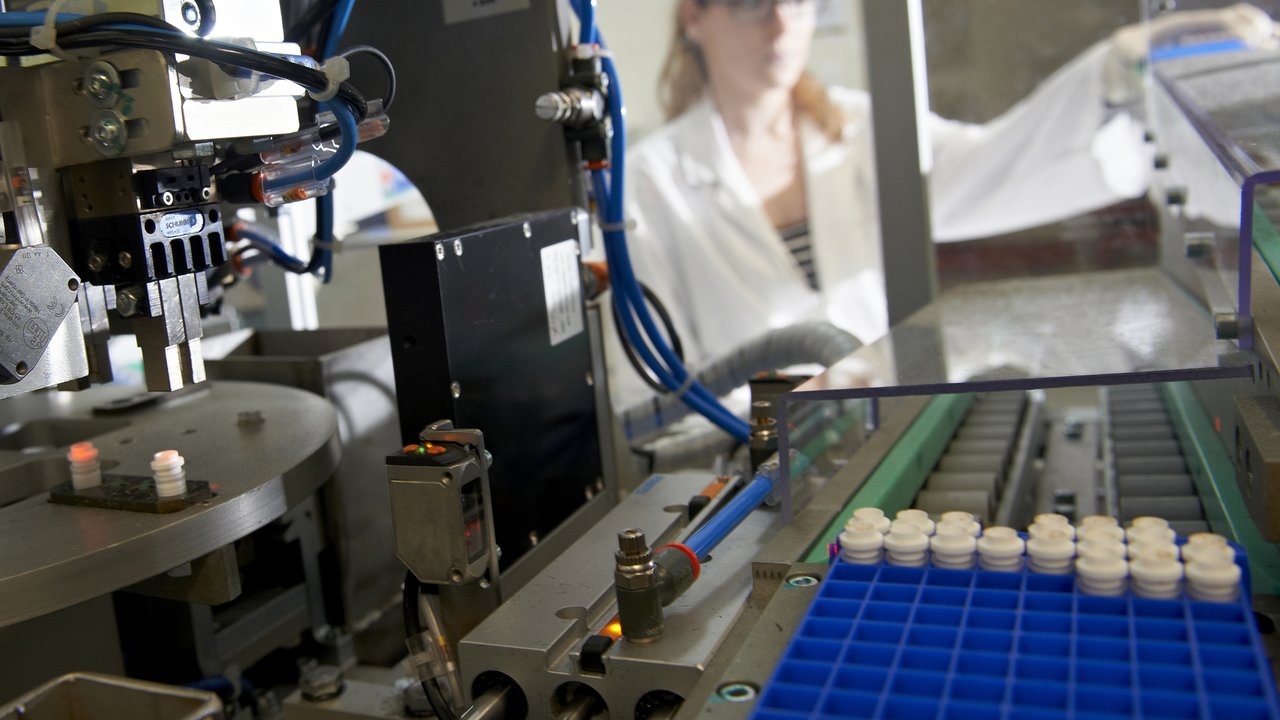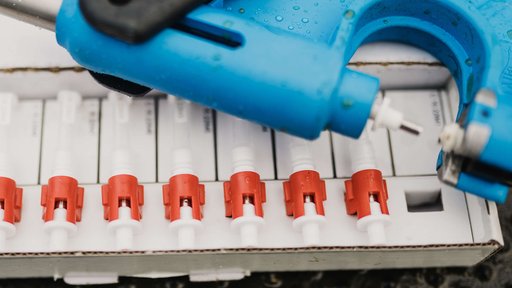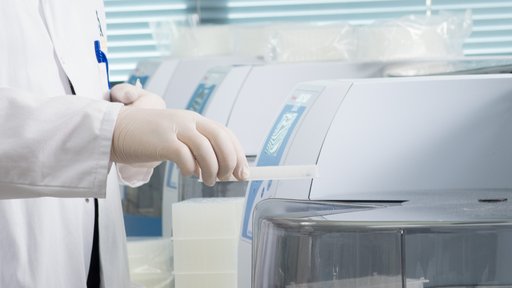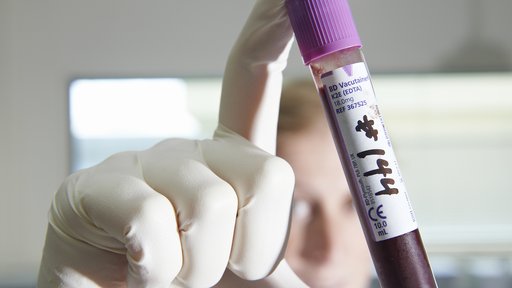Most of our animal tests are done using milk samples or tissue samples. Some can be done using blood or faecal samples.
You can easily take tissue samples yourself. Your vet will usually take the blood samples. In most cases we get milk samples from your dairy company or from herd tests.
The samples we use for animal testing are:
- milk samples
- tissue samples
- blood samples
- faecal samples
Tests that use milk samples
We use milk samples for:
- Johne's disease whole herd testing
- BVD bulk milk testing
- BVD PI Hunt
- Milk pregnancy testing
- Staph. aureus testing
In most cases you don’t need to send the milk samples to us — we use either bulk milk samples from your dairy company or individual milk samples from herd testing.
You may need to send us a custom sample to check the BVD status of a small number of cows in your herd. Call us on 0800 436 362 to find out how to collect and send us a custom milk sample.
Tests that use tissue samples
We use tissue samples for:
- DNA parentage & genomic evaluation testing
- A2/A2 geneotype testing
- BVD testing
It’s easy to take the tissue samples yourself — just follow the instructions in:
- Collecting tissue samples for DNA, A2/A2 and BVD testing.
Tests that use blood samples
We can use blood samples for:
- BVD testing
- Johne's disease testing for individual animals
In most cases your vet will take the blood samples using a purple top blood tube.
Collecting tissue samples
|
Test |
Tissue sampling unit |
Storage conditions |
|---|---|---|
|
Test DNA parentage & genomic evaluation |
Tissue sampling unit Wet TSU |
Storage conditions Fridge |
|
Test A2/A2 |
Tissue sampling unit Wet or Dry TSU |
Storage conditions Fridge (Wet) or Freezer (Dry) |
|
Test Standalone BVD (animals younger than 35 days) |
Tissue sampling unit Dry TSU |
Storage conditions Freezer |
|
Test Standalone BVD (animals older than 35 days) |
Tissue sampling unit Wet or Dry TSU |
Storage conditions Fridge (Wet) or Freezer (Dry) |
|
Test BVD + DNA parentage(animals younger than 35 days) |
Tissue sampling unit Wet and Dry TSU (2x samples required) |
Storage conditions Fridge (Wet) or Freezer (Dry) |
|
Test BVD + DNA parentage (animals older than 35 days) |
Tissue sampling unit Wet TSU |
Storage conditions Fridge |
1. Order your sampling equipment
The GeneMark Allflex applicator gun and the GeneMark Allflex punch kits make sampling quick, easy and hassle free.
To take tissue samples you need an applicator gun and enough punch kits to get samples from all the animals you want to test. Each punch kit contains 10 tissue sampling units.
You can order sampling equipment by:
- calling 0800436 362
- contacting your local LIC rep
- ordering via the LIC Shop
2. Sample your animals
To sample your animals follow these steps:
- Take a new tissue sampling unit (TSU) out of the punch kit and fit it into the applicator gun.
- Record the tag number of the animal you are sampling on the card on the front of the punch kit — be careful to match the barcode on the TSU with the barcode on the card.
- Collect the tissue sample using the applicator gun.
- Remove the TSU from the applicator gun and put it into a ziplock bag.
- When you’ve used all 10 TSUs in the punch kit remove the completed card and put it into the ziplock bag with the TSUs.
- Use a new ziplock bag for each group of animals you sample (calves, cows, previous season’s progeny and natural mating bulls).
- Wet TSU’s (contain a liquid preservative) must be stored in the fridge if you are not planning on sending to the lab immediately.
- Dry TSU’s must be stored in the freezer.
For more information on how to sample your animals safely and effectively, see:
Guide to using the GeneMark Allflex applicator gun and the GeneMark Allflex Tissue punches
For details on maintaining your applicator, or fixing common issues, see:
Allflex applicator maintenance & troubleshooting guide
3. Courier us your samples
Courier the samples to our laboratory using the courier bag provided. You don’t need to keep the samples chilled for couriering, but make sure they get to us no later than midday on a Friday so they arrive when our laboratory is attended.
Please ensure you include a submission form with your samples.
- DNA parentage & genomic evaluation - GeneMark Genomics Sample Submission form
- BVD - Animal Health Sample Submission form
- A2/A2 - GeneMark Genomics Sample Submission form
- DNA & BVD combo - GeneMark Genomics Sample Submission form
Send the samples with the completed submission forms to:
LIC Diagnostics
140 Riverlea Road
Hillcrest
Hamilton 3216
You’ll receive a confirmation email from the lab once your samples have been received.
4. Getting the results
We’ll email the results of the tests to you and we’ll also upload them to MINDA.
- GeneMark Genomics parentage test results arrive within four weeks.
- Female animals will then be processed for Genomic Evaluation (GEv) testing, with estimated turnaround times as follows:
- GEv results for calves and heifers will be emailed to you after 10 working days, at which time you will receive your genomic evaluation report and breeding values will be updated in MINDA.
- GEv results for dams will be emailed to you within 25 working days and breeding values will be updated in MINDA at the next available GE run.
- BVD results for animals older than 35 days (BVD Ag ELISA test) have a turnaround time of 2-3 days after being received at the Animal Health lab.
- BVD results for animals younger than 35 days (BVD PCR test) is 5-7 days.
- A2/A2 tissue results have a turnaround time of 3 weeks.
Use blood samples to test for:
- the BVD virus in calves less than 35 days old
- the BVD virus in older animals when you can’t take a tissue sample
- Johne's disease in individual animals to confirm you have the disease in your herd before going ahead with whole herd testing using milk samples.
In most cases your vet will take the blood samples using a purple top blood tube. You can also call AssureQuality on 0508 001 122 to organise sampling.
Chill the blood samples if you’re not sending them immediately. Complete the appropriate submission form:
- GeneMark Genomics Sample Submission form
- Animal Health Sample Submission form for Johne’s disease and BVD testing.
Tick the relevant box on the form and send the samples and the completed submission form by courier to:
LIC Diagnostics
140 Riverlea Road
Hillcrest
Hamilton 3216




